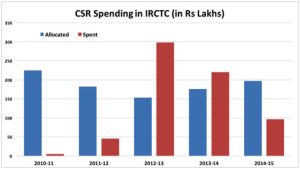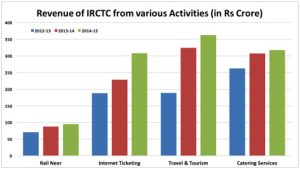The Parliamentary Standing Committee rapped Indian Railway Tourism and Catering Corporation Ltd. (IRCTC), a Public Sector Undertaking (PSU) under the Ministry of Railways over usage of its CSR funds.
The standing committee noted that the CSR policy as approved by IRCTC board was not in conformity to the CSR Guidelines issued by the DPE. The committee noted that IRCTC was spending some of its CSR money on upgradation of passenger amenities and provision of infrastructure for passengers at railway stations. This, the committee reminded is the primary responsibility of the Ministry of Railways.
The committee noted that both the Ministry of Corporate Affairs and the Department of Public Enterprises (DPE) have time and again issued clarifications that expenses incurred by Companies for fulfilment of statutory obligations would not count as CSR expenditure. Hence inclusion of the welfare of customers, consumers, railway passengers and railway employees in their CSR Policy document is not in conformity of the CSR Guidelines issued by the Government.
As per the committee’s report, some of the CSR activities undertaken by IRCTC clearly do not qualify as per the guidelines issued by government. These activities relate to provision of amenities for passengers and should have been met from the regular budget of IRCTC or the Railways, but not the CSR allocation. The committee cited activities like provision of RO treated pure drinking water facility at NRCH, New Delhi in 2013-14 and carrying out sanitation work at Delhi Cantonment Railway Station in 2014-15.
The committee also noted that the CSR spending of IRCTC has not been satisfactory for 2010-11, 2011-12 and 2014-15, further saying that unspent funds were not carried forward. While Rs 2.25 crore was allocated in 2010-11, only 5 lakh were spent by IRCTC. In 2011-12, only 45.37 lakh were spent by IRCTC against an allocation of Rs 1.82 crore.
The committee advised IRCTC to relook at its CSR Policy and revise it in line with the guidelines issued by DPE. The committee also recommended that IRCTC should not allocate CSR funds for any activities that are the primary responsibility of IRCTC or Indian Railways. Further, the committee suggested that the CSR funds allocated for a purpose and a particular year should be spent in the same year.
Established in 1999, IRCTC is an extended arm of the Indian Railways to upgrade, professionalise and manage the catering and hospitality services at stations, on trains and other locations. It also aims to promote domestic and international tourism through development of budget hotels, special tour packages, information & commercial publicity and global reservation systems. In 2015-16, IRCTC clocked a revenue of Rs 1505 crore with a profit after tax of Rs 188.6 crore as per the report of the Parliamentary Standing Committee on Public Sector Undertakings.
What all does IRCTC do?
As per the report, IRCTC earns revenues through the following core services
- Catering Services
- Internet Ticketing
- Tourism Services
- Packaged drinking water (Rail Neer)
IRCTC’s revenue increased from Rs 953 crore in 2013-14 to Rs 1103 crore in 2014-15. It further increased to Rs 1505 crore in 2015-16. The revenues and profits from Internet Ticketing, Tourism & Packaged drinking water is continuously increasing while the catering business is making losses.

The internet ticketing on IRCTC began in 2002 with a mere 29 tickets booked on the first day. More than 13 lakh tickets were booked on 1st April, 2015. In 2014-15, 18.3 crore tickets were booked on IRCTC for 32.88 crore passengers. The service tax component of the internet booking was shared in the ratio of 80:20 between IRCTC and the Indian Railways till 2014-15. In 2015-16, the ratio was changed to 50:50. IRCTC also made a revenue of Rs 9.65 crore by air ticket booking in 2015-16.
Thank you for reading the story until the very end. We appreciate the time you have given us. In addition, your thoughts and inputs will genuinely make a difference to us. Please do drop in a line and help us do better.
Regards,
The CSR Journal Team

